
| ||
 | ||

 Virginia Douglas Emeritus Professor of Psychology |
Professor Virginia Douglas is an internationally renowned researcher and teacher in the field of childhood psychopathology. She has made major contributions to the study of attention-deficit/hyperactivity disorder (ADHD), a cluster of difficulties that has disabling influences on the learning and social lives of affected children. For more than 25 years, she has helped set the direction for research on ADHD and also contributed substantially to our understanding of how to improve the lives of affected children. Her research, which shows that hyperactivity is not a purely behavioural phenomenon, but is accompanied by fundamental cognitive deficits, has had a profound impact on our understanding and treatment of ADHD. She was one of the first researchers to use experimental tasks to identify specific deficits of attention, inhibition, learning, memory and motivation in children with ADHD. Her articles on treatment are landmarks in the field and two of her papers have been designated as "citation classics." Her contributions have been recognized by numerous major awards such as the Canadian Psychological Association Award for Distinguished Contributions to Psychology as a Profession and the Outstanding Achievement Award from the Association for Children and Adults with Attention Deficit Disorders. Douglas has published over 80 scientific articles, supervised 20 doctoral students and established a research centre at the Montreal Children's Hospital. She has served as chair of the Department of Psychology and president of the Canadian Psychological Association.
| |
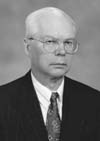 Romuald Knystautas Emeritus Professor of Mechanical Engineering |
Professor Romuald Knystautas obtained all three of his degrees at McGill, and, apart from a short spell at the Defence Research Establishment in Val Cartier, has been either a student or a faculty member at McGill since he first arrived in the late 1950s. His extensive research career has centred on the general area of combustion and, during the course of his career, he has established an international reputation as an expert in large-scale explosion experiments. Knystautas's most important scientific contribution may have been made in the late 1970s and early 1980s when he carried out systematic measurements of the detonation cell size for fuel-oxygen and fuel-air mixtures, establishing what is now the standard methodology for assessing the detonation sensitivity of fuel mixtures. He also carried out a rigorous study of turbulent flame acceleration phenomenon, leading to transition criteria for the progression from deflagration to detonation. His expertise was formally recognized in 1995 when he was awarded the Soloukhin Medal for outstanding experimental research in detonation phenomenon. Knystautas has also made significant contributions to teaching and to the administration of the Department of Mechanical Engineering. He has served as the department's vice-chair and was responsible for the complete review of the mechanical engineering curriculum a few years ago. A two-time winner of the Faculty of Engineering Outstanding Teacher Award, Knystautas has taught some of the most difficult courses in mechanics and fluid mechanics, involving classes with large enrolments.
| |
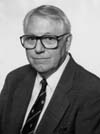 Gordon Maclachlan Emeritus Professor of Biology |
Professor Gordon Maclachlan came to McGill in 1962 as an associate professor of botany. In 1970, when the Department of Biology was formed by fusing the Departments of Botany, Zoology and Genetics, Maclachlan was named its first chair. He served until 1975, guiding the development of policies and procedures and promoting rigourous standards that fostered growth of the biology department into a major international centre of research and teaching. In 1980, he was named dean of the Faculty of Graduate Studies and vice-principal (research), a post he held until 1990, overseeing an unprecedented growth in research activity. Maclachlan has maintained an active and distinguished research career investigating the biochemistry of plant cell walls. This has resulted in the publication of over 80 peer-reviewed articles, as well as numerous chapters and symposium contributions. In recognition of his research contributions, he has been asked to serve numerous terms as president of Canadian research societies and as member and chair of grant selection committees and was awarded the Gold Medal of the Canadian Society of Plant Physiologists. In 1990, McGill established the Gordon Maclachlan Award to be given annually at convocation for the best PhD thesis in the biological sciences. The Canadian Association of University Research Administrators presented Maclachlan with its Walter Hitschfeld Prize in 1992 in recognition of his contributions to university research. Maclachlan has been a dedicated teacher of undergraduate and graduate students. Many of his former master's and doctoral students are now professors, medical doctors and professional researchers.
| |
 Eric Mountjoy Emeritus Professor of Earth and Planetary Sciences |
Professor Eric Mountjoy has been one of the country's top specialists in sedimentary and structural geology, carrying out most of his research in the Rocky Mountains of western Canada and the adjacent subsurface of the western Canada sedimentary basin. He has spent over 45 summers in the field, often under trying conditions on difficult terrain, backpacking or travelling on horseback and, more recently, by helicopter. As well as mapping the northern half of Jasper National Park, Mountjoy has mapped most of the Canadian Rockies between Banff and Jasper with Queen's University professor R. Price. Their cross-sections have become classic representations of the structure of a thrust-fold mountain belt and have been published in many textbooks. He is recognized as a world expert on Devonian reefs, carbonate diagenesis, porosity development and the structure of the Rocky Mountains. His research has also provided useful applications to the petroleum industry. Mountjoy has directed the research of 50 master's and doctoral students, many of whom have gone on to become professors. In recognition of his excellence as a teacher and supervisor of graduate students, he recently earned the David Thomson Award of the Faculty of Graduate Studies and Research. In 1997, he was awarded the Logan Gold Medal, the highest award of the Geological Association of Canada, and in 1998, the F.J. Pettijohn Medal for excellence in sedimentiology by the Society of Sedimentary Geology. He maintains an active research program and continues to contribute significant time to teaching. Summers are spent in the Rockies with students and colleagues, where his life's work carries on.
| |
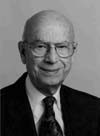 Manuel Gilman Batshaw Honorary Doctor of Laws |
A Montrealer by birth, Manuel Gilman Batshaw studied at Case Western Reserve University, Queen's University and McGill, where he received a BA in 1937 and a diploma in social work in 1938. He began his social work career as a case worker for single men at the Baron de Hirsch Institute on Bleury Street. During the war years, he became director of social services for military district four, which included all of Quebec between Montreal and Quebec City. In the years following his military service, Batshaw filled executive positions at the Jewish Community Council of Hamilton, Philadelphia's Neighbourhood House, the Network YMHA and the National Jewish Welfare Board, where he later became the organization's director of national services. In 1968, Batshaw became the executive director of the Allied Jewish Community Services in Montreal, a position he held for 12 years. He became known for his ability to forge alliances between government and nongovernmental health and social services agencies in Montreal. In 1975, he was asked by the Quebec government to head a commission to study "Les Enfants et Adolescents placŽs en 60 centres d'accueuil dans la province du QuŽbec." The committee's 11-volume report contained 168 recommendations for improving the care and treatment of children, with an emphasis on deinstitutionalization. The report led to major changes in child welfare laws and in the way child care workers are trained. In 1993, four of the English-speaking child welfare agencies merged and took on the name "Batshaw Youth and Family Centres" in recognition of Batshaw's professional and volunteer contributions to the well-being of children. He has also been a significant leader in Montreal's Jewish community, serving as executive vice-president of the Allied Jewish Community Services of Montreal, director of program and research of the National Jewish Welfare Board and executive director of the YM and YWHA's Community Centres and Federation of Communal Services. Since 1980, he has been a personal consultant to Charles Bronfman, advising him in all his Jewish and non-sectarian philanthropic communal interests. Batshaw presided over the planning and construction of major community projects in Montreal, including the Jewish Federation of Agencies Building, the Golden Age Centre (Montreal's largest and most extensive recreation centre for seniors) and several low-cost housing buildings for senior citizens. The Montreal Jewish community honoured him in 1984 with its highest award, the Bronfman Medal, for outstanding community service. The Quebec government named him Chevalier de l'Ordre national du QuŽbec in 1995. The first graduate of the School of Social Work to receive an honorary degree from McGill, the occasion helps mark the 80th anniversary of the school's founding.
| |
 John D. Eberts Honorary Doctor of Letters |
John "Jake" Eberts was born in Montreal and grew up in Arvida, near Chicoutimi. The Eberts name has long been associated with McGill. Jake, like his father and grandfather, studied at McGill, earning a bachelor's degree in chemical engineering in 1962. In all, almost 30 members of his family have graduated from the University. He began his business career as an engineer for Air Liquide, but changed direction and worked on Wall Street after obtaining an MBA from Harvard. In 1974, he was managing director of the London, England, office of Oppenheimer & Co., a firm of investment bankers, when his career took another turn. He was approached by the producer of the film Watership Down for help in arranging financing. Over the next two years, he became captivated by his experiences in the film business. He quit his job and formed his own company, Goldcrest Films, to continue developing and producing movies. Between 1977 and 1984, Goldcrest grew into one of the most successful independent production companies in the entertainment industry, financing the development, production or distribution of such films as Chariots of Fire, Gandhi, Local Hero, The Killing Fields and The Dresser. He left Goldcrest, unhappy that it had grown into a bigger company than he had wanted it to be, and began work at Embassy Films, where he played a crucial role in overseeing the production of the film The Emerald Forest. In 1986, he again founded a small company dedicated to financing quality films. Since then, Allied Filmmakers has proved to be even more successful than Goldcrest. The company has helped launch such movies as The Name of the Rose, Hope and Glory, Driving Miss Daisy, Dances With Wolves and A River Runs Through It. This summer, an Eberts-produced film about the life of British naturalist and author Archie Belaney, who wrote about Canada's vanishing wilderness and gained international fame as Grey Owl, was shot in Montreal. Other current Eberts projects include films by Robert Redford and Wallace and Gromit creator Nick Park. In all, the films in which Eberts has been involved have earned 67 Academy Award nominations. In 1990, he revealed a further talent when he co-wrote a book about his experiences at Goldcrest titled My Indecision is Final. The book was named one of the best business books of the year by The Financial Times. Eberts has raised money for a variety of causes, including the Piggery Theatre in North Hatley, the Sundance Institute, conservation efforts in the St. Lawrence River Valley and the fight against muscular dystrophy and diabetes. In 1992, he was named to the Order of Canada.
| |
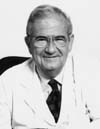 Dr. Isadore Rosenfeld Honorary Doctor of Science |
Isadore Rosenfeld is a native of Montreal who received his bachelor of science degree from McGill in 1947 and a medical degree from the University in 1951. As a student at McGill, Rosenfeld was the president of the Young Liberals Club and a speechwriter for the Liberal Party. As a member of the McGill Debating Union, Rosenfeld and partner Edward Hugessen went undefeated in two years of international student debating. After graduating in 1951, he trained in internal medicine at the Royal Victoria Hospital and in cardiology at the Jewish General Hospital. He won McGill's Sir Edward Beattie Scholarship, which enabled him to take up a fellowship in cardiology at Mount Sinai Hospital in New York. In 1956, Rosenfeld obtained a diploma in internal medicine from McGill. After leaving Mount Sinai, he became an instructor and then a clinical professor of medicine at Cornell University Medical College in New York and attending physician at the New York Presbyterian Hospital. In 1993, he was installed as Cornell's Ida and Theo Rossi Distinguished Professor of Clinical Medicine. Rosenfeld is a Fellow of the Royal College of Physicians of Canada, the American College of Physicians and the Royal Society of Medicine. He recently completed a four-year term on the Advisory Council to the United States Secretary of Health. He was the recipient of the first award from the New York Chapter of the American Heart Association for contributions to medicine and cardiology. He is best known to the public for his enormous skill as a medical communicator. He has published seven books on medicine and health aimed at the general public and six of them have been best-sellers. His latest volume, a book on aging, will be published next June. Rosenfeld is a medical consultant to Fox Cable News, has been a monthly health columnist for Vogue and recently started writing a regular column for Parade, a magazine with a readership of 80 million.
| |
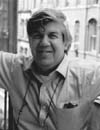 Stephen Jay Gould Honorary Doctor of Science |
Stephen Jay Gould grew up in New York City, where an early encounter with the skeleton of Tyrannosaurus rex in the American Museum of Natural History initiated his interest in paleontology. After earning a PhD from Columbia University, Gould began his long association with Harvard University as an assistant professor of geology and assistant curator of invertebrate paleontology. Since 1982, he has been Harvard's Alexander Agassiz Professor of Zoology. From the very beginning of his career, Gould stood out among paleontologists for going beyond the usual description of fossils and their assignment to specific geological horizons. Gould analyzed their patterns of growth and change and investigated a wide range of evolutionary processes that may have governed these patterns. This research led to his first, highly influential book, Ontogeny and Phylogeny. Few scientists go beyond the accepted paradigm of their generation to establish a new way of thinking about the natural world. Gould has been able to see the world in a new light, questioning such concepts as the gradual, continual and progressive change of organisms as a result of natural selection and the basically deterministic pattern of large scale evolution. An early paper co-written with Niles Eldredge posited that the fossil record of marine invertebrates strongly contradicted the assumption of all evolutionary biologists since the time of Darwin. The fossil record didn't demonstrate gradual and continuous evolutionary change, but rather showed a pattern of long-term stasis, interrupted by short periods of change. These observations led Gould to a revolutionary new view of evolution, involving phenomena from the level of populations and species to the entire span of life on Earth. Efforts to test his hypotheses have resulted in new approaches to research for an entire generation of paleontologists. Instead of focusing on evolution as a steady and consistent process, Gould's focus on the unexpected within nature reflects a view that permeates his work: that natural history is significantly altered by out-of-the-ordinary events and is largely revealed by examining its "imperfections." Among the prizes he has won for his work are the MacArthur Foundation Prize, membership in the National Academy of Sciences and the Schuchert Award for excellence in paleontological research. As remarkable as he is as a scientist, Gould is even more influential as an author. He is the among the most respected science writers of his generation, possessing a rare gift for writing about complex scientific concepts in an easily accessible and highly polished fashion. His books are invariably best-sellers. He has won the National Book Award and been a finalist for the Pulitzer Prize.
| |
|
| ||
|
| |||||